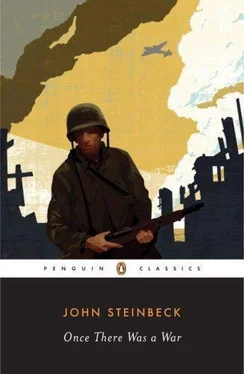John Steinbeck - Once there was a war
Здесь есть возможность читать онлайн «John Steinbeck - Once there was a war» весь текст электронной книги совершенно бесплатно (целиком полную версию без сокращений). В некоторых случаях можно слушать аудио, скачать через торрент в формате fb2 и присутствует краткое содержание. Город: New York, Год выпуска: 1960, Издательство: Bantam Books, Жанр: Классическая проза, на английском языке. Описание произведения, (предисловие) а так же отзывы посетителей доступны на портале библиотеки ЛибКат.
- Название:Once there was a war
- Автор:
- Издательство:Bantam Books
- Жанр:
- Год:1960
- Город:New York
- ISBN:нет данных
- Рейтинг книги:3 / 5. Голосов: 1
-
Избранное:Добавить в избранное
- Отзывы:
-
Ваша оценка:
- 60
- 1
- 2
- 3
- 4
- 5
Once there was a war: краткое содержание, описание и аннотация
Предлагаем к чтению аннотацию, описание, краткое содержание или предисловие (зависит от того, что написал сам автор книги «Once there was a war»). Если вы не нашли необходимую информацию о книге — напишите в комментариях, мы постараемся отыскать её.
Once there was a war — читать онлайн бесплатно полную книгу (весь текст) целиком
Ниже представлен текст книги, разбитый по страницам. Система сохранения места последней прочитанной страницы, позволяет с удобством читать онлайн бесплатно книгу «Once there was a war», без необходимости каждый раз заново искать на чём Вы остановились. Поставьте закладку, и сможете в любой момент перейти на страницу, на которой закончили чтение.
Интервал:
Закладка:
Bugs probably fought the toughest war in all Sicily, for he carried the mirror on his back the whole way. When the shellfire was bad, he turned his mirror face down and covered it with dirt. On advances he left it and always came back in the night and got it again, although it entailed marching twice as far as the rest of his outfit.
Finally Bugs arranged a kind of sling, so that while advancing he had the appearance of a charging billboard. He gradually came to devote a good part of his life to the care, transportation, and protection of the biggest souvenir in the whole Seventh Army. When he finally marched into Palermo he did so in triumph, for his mirror was un-chipped and its frame was only a little chewed up from handling.
Now, for the first time, Bugs was billeted in a house, one of those tall houses with iron balconies and narrow stairs. Bugs tried in vain to get the mirror around a corner of the narrow stairway and finally he got a rope and, tying one end of it to the balcony, he went back to the street and tied the other end of it to his mirror. Then he went back and hauled it up to the second floor, where he was billeted. There he surveyed the room and decided where to hang his mirror. He drove a nail in the wall, hung the mirror, and stepped back to admire it. And he had just stepped clear when the nail pulled out and the whole thing crashed and broke into a million pieces.
Bugs regarded the mess sadly, but then the great philosophy of the “blowed in the glass” souvenir-hunter took possession of him. He said, “Oh, well, maybe it wouldn’t have looked good in our flat, anyways.”
WELCOME
SOMEWHERE IN THE MEDITERRANEAN WAR THEATER, October 14, 1943 —
The Italian people may greet conquering American and British troops with different methods in different parts of the country, but they act always with enthusiasm that amounts to violence. One of their methods makes soldiers a little self-conscious until they get used to it. Great crowds of people stand on the sidewalks as the troops march by and simply applaud by clapping their hands as though they applauded a show. This makes the troops walk very stiffly, smiling self-consciously, half soldiers and half actors.
But this hand-clapping is the most restrained thing that they do. The soldiers get more embarrassed when they are overwhelmed by Italian men who rush up to them, overpower them with embraces, and plant great wet kisses on their cheeks, crying a little as they do it. A soldier hates to push them away, but he is not used to being kissed by men, and all he can do is to blush and try to get away as quick as possible.
A third method of showing enthusiasm at being conquered is to throw any fruit or vegetable which happens to be in season at the occupying troops. In Sicily the grapes were ripe and many a soldier got a swipe across the face with a heavy bunch of grapes tossed with the best will in the world.
The juice ran down inside their shirts, and after a march of a few blocks troops would be pretty well drenched in grape juice, which, incidentally, draws flies badly, and there is nothing to do about it. You can’t drown such enthusiasm by making them not throw grapes.
One of the most ridiculous and most dangerous occupations, however, was the investment and capture of the island of Ischia. There the people, casting about for some vegetable or floral tribute, found that the most prominent and showy flower of the season was the pink amaryllis. This is not a pleasant flower at the best, but in the hands of an enthusiastic Italian crowd it can almost be a lethal weapon.
A reasonable-sized bunch of amaryllis, with big, thick stems, may weigh four pounds. In a short drive through the streets of the city of Ischia, some of the troops were nearly beaten to death with flowers, while one naval officer was knocked clear out of a car by a well-aimed bouquet of these terrible flowers. His friends proposed him for a Purple Heart, and wrote a report on his bravery in action. “Under a deadly hail of amaryllis,” the report said, “Lieutenant Commander So-and-So fought his way through the street, although badly wounded by this new and secret weapon.” A man could easily be killed by an opponent armed with amaryllis.
The pressures on the Italians must have been enormous. They seem to go to pieces emotionally when the war is really and truly over for them. Groups of them simply stand and cry — men, women, and children. They want desperately to do something for the troops and they haven’t much to work with. Bottles of wine, flowers, any kind of little gift. They rush to the churches and pray, and then, being afraid to miss something, they rush back to watch more troops. The Italian soldiers in Italy respond instantly to an order to deliver their arms. They pile their rifles up in the streets so quickly that you have the idea they are greatly relieved to get the damned things out of their hands once for all.
But whatever may have been true about the Fascist government, it is instantly obvious that the Italian little people were never our enemies. Whole towns could not put on such acts if they did not mean it. But in nearly every community you will find a fat and sleek man, sometimes a colonel, sometimes a civil administrator. Now and then he wears the silver dagger with the gold tip on the scabbard, which indicates that he was one who marched on Rome with Mussolini.
In a country which has been hungry this man is well fed and beautifully dressed. He has been living on these people since Fascism came here, and he has not done badly for himself. On the surrender of a community he is usually the first to offer to help in the government. He will do anything to help if only he can just keep his graft and his power.
It is to be hoped that he is never permitted either to help or to stay in his position. Indeed, our commanders are usually visited by committees of townspeople and farmers who ask that the local Fascist be removed and kept under wraps.
They know that if he ever gets power again he will avenge himself on them. They hate him and want to be rid of him. And if you ask if they were Fascists, most Italians will reply, “Sure, you were a Fascist or you didn’t get any work, and if you didn’t work your family starved.” And whether or not this is true, they seem to believe it thoroughly.
As the conquest goes on up the length of Italy, the crops are going to change. Some soldiers are already feeling an apprehension for the cabbage districts and the potato harvest, if they too are used as thrown tokens of love and admiration.
THE LADY PACKS
SOMEWHERE IN THE MEDITERRANEAN WAR THEATER, October 15, 1943 —
There is a little island very close to the mainland near Naples which has on it a very large torpedo works, one of the largest in Italy. When Italy had surrendered, the Germans took the island, mined it thoroughly, and ran the detonating wires under the water to the mainland, so that they could blow up the torpedo works if it seemed likely to be captured. The Germans left a few guards, heavily armed, and they also left an Italian admiral and his wife as a sort of hostage to the explosives planted all over the little island.
To a small Anglo-American naval force a curious order came. One single torpedo boat was to take on some British commandos, who were to go ashore in secrecy, cut the wires to the mainland, kill the German guards, and evacuate the Italian admiral and his wife.
The boat assigned was a motor torpedo boat and it lay alongside a pier in the afternoon and waited for the commandos to come aboard. The celebrated commandos, the great swashbucklers, took their time in arriving. In fact, they arrived nearly at dusk, five of them, which to their mind is a large military force. And these were very strange men.
Читать дальшеИнтервал:
Закладка:
Похожие книги на «Once there was a war»
Представляем Вашему вниманию похожие книги на «Once there was a war» списком для выбора. Мы отобрали схожую по названию и смыслу литературу в надежде предоставить читателям больше вариантов отыскать новые, интересные, ещё непрочитанные произведения.
Обсуждение, отзывы о книге «Once there was a war» и просто собственные мнения читателей. Оставьте ваши комментарии, напишите, что Вы думаете о произведении, его смысле или главных героях. Укажите что конкретно понравилось, а что нет, и почему Вы так считаете.









